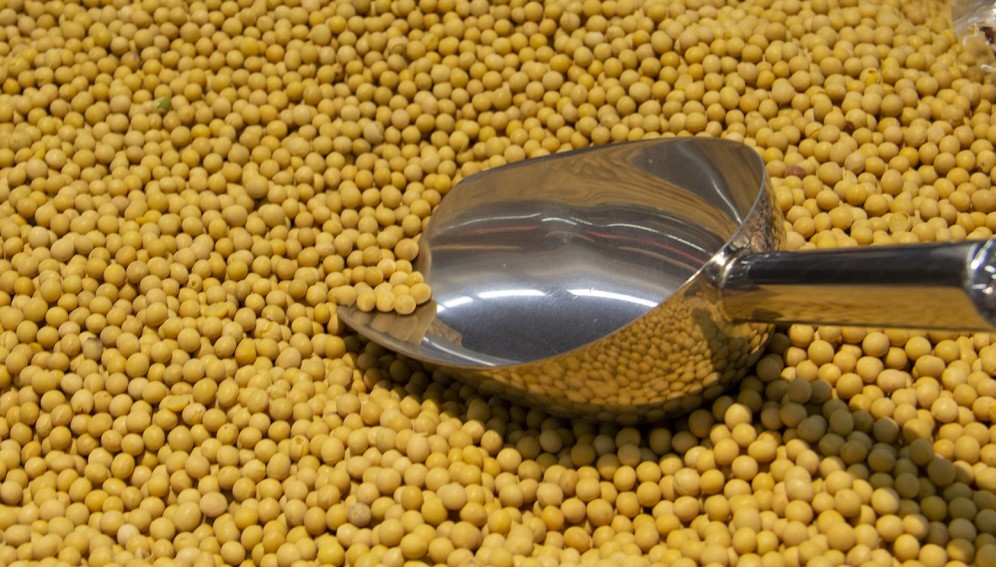Read in
By: Nelson Mandela Ogema
[NAIROBI] Genetically modified (GM) soybean plants with the ability to efficiently harness sunlight could improve the crop’s yield and boost food security in Sub-Saharan Africa, agriculture experts say.
According to a study published in Science last month, the researchers genetically modified three genes of soybeans by effectively upgrading photosynthesis – a natural process by which plants transform light into food – the modified soybeans had an increased yield of 25 per cent across five trials with one trial having up to 33 per cent increase.
Almost 811 million people went hungry in 2021 as the COVID-19 pandemic and climate change heavily impacted food security, with many crops facing harsh growing conditions, according to a report by the Food and Agriculture Organization (FAO) on the state of food security and nutrition in the world in 2022.
Although the average yield of soybeans is about 2,760 kilograms per hectare globally, African farmers produce 1,260 kilograms per hectare, with 15 of the 24 countries in Africa for which yield data exists each having less than 1,000 kilograms per hectare, according to a 2019 article published in the African Journal of Food, Agriculture, Nutrition and Development.
Low yields of soybean motivated the implementation of the Realising Increased Photosynthetic Efficiency (RIPE) project at the US-based University of Illinois Urbana-Champaign with the aim of genetically transforming soybeans. This resulted in the planting of new varieties in the field in 2020 and 2021.
“This study is a major breakthrough showing that we can increase productivity in major agronomic crops with the improvement of the photosynthetic process.”
Amanda Pereira De Souza, Realising Increased Photosynthetic Efficiency (RIPE) project
Amanda Pereira De Souza, a co-author of the study and a research scientist at the RIPE project, says: “This study is a major breakthrough showing that we can increase productivity in major agronomic crops with the improvement of the photosynthetic process.
“We are now starting to translate the knowledge we have from this work to soybean cultivars from Sub-Saharan Africa and other major important crops in the region such as cassava and cowpea.”
De Souza says that the increase in yield seen in the United States is similar to that found in soybean cultivars from Africa.
New SDN Plus in-article advert
According to De Souza, the journey of bioengineering to make photosynthesis efficient and increase yields in food crops began nearly two decades ago with mathematical models showing that parts of the photosynthetic process were not at their full capacity.
“Since then, there have been many other studies to understand which genes to alter in the plant to have the needed improvement,” she adds. “The key finding of this study is that improving photosynthetic efficiency under fluctuating light conditions such as those [that] plants in the field experience all the time can increase seed production by up to 33 per cent.”
Frejus Ariel Sodedji, an agricultural research associate at the University of Abomey-Calavi, Benin, tells SciDev.Net that the study could boost food security in Africa.
“With the projected warmer climate in Africa … the increase of soybean yields by up to 33 per cent through the current innovation could mean more foods, jobs and more resilient food systems in Africa,” Sodedji explains.
Sodedji adds that deploying the innovation in African farming systems could create positive changes across the value chains in soybean-growing African countries, helping to achieve Sustainable Development Goals such as ending hunger and promoting sustainable agriculture.
“Although the breakthrough is very promising in Africa, its scaling up should take into account the socio-economic, political and environmental context prevailing in each country, to customise the diffusion of technology,” he explains. “There are still many barriers – health, legal and ethical concerns – to the adoption of transgenic [GM] crops in Africa.” donations ad 2
Paul Chege, a crop scientist and agribiotechnology expert in Kenya, adds that many African countries suffer the most from climate change-related and unpredictable weather patterns, especially in arid and semi-arid areas of the continent.
“Any technology that is safe and assures marginal increase in crop yield would greatly benefit Africa,” he tells SciDev.Net.
This piece was produced by SciDev.Net’s Sub-Saharan Africa English desk.



